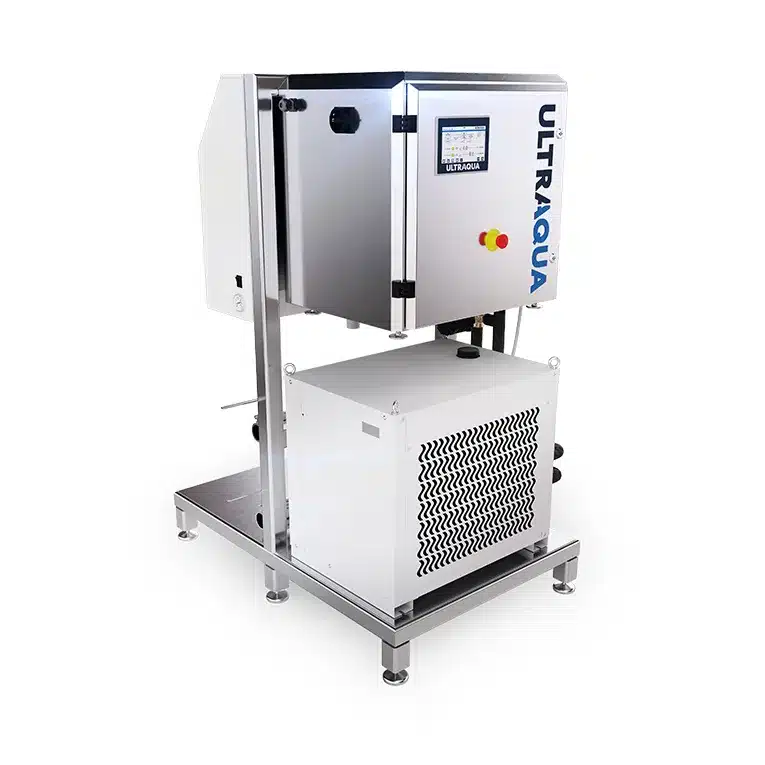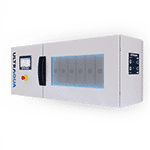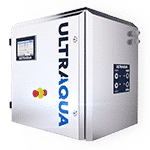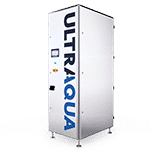About Ozone technology
BASICS OF OZONE TECHNOLOGY
Ozone technology is a globally recognized solution for water disinfection that effectively oxidizes a wide range of contaminants, including bacteria, viruses, as well as organic and inorganic substances. The need for efficient and sustainable solutions to provide clean water is at an all-time high and continuously increasing. Ozone treatment addresses this complex issue, meeting the most stringent requirements for bacteria and virus protection, as well as improving the overall quality of water.
Ozone technology leverages the powerful oxidizing properties of ozone (O3), utilizing triatomic molecules that consist of three oxygen atoms. For most applications, ozone is generated on-site, by converting oxygen (O2) molecules into ozone (O3). This approach enables the on-demand generation of ozone, ensuring potent and continuous water treatment. By introducing ozone into water (called ozonation), the ozone rapidly reacts with contaminants, effectively neutralizing them without leaving harmful residues. In simpler terms, water treatment using ozone involves producing ozone gas, which is a strong oxidant, followed by mixing it with the water to purify it.
As ozone is a chemical-free technology, the natural properties of the water can be maintained, by not introducing harmful chemicals. Ozone dissipates quickly, which leads to a significant reduction of the risks associated with handling and storage of disinfectants. The dissipation means that no long-term environmental pollutants are released into the water or the atmosphere.

Ozone Benefits
THE BENEFITS OF OZONE SYSTEMS
Ozone technology provides an effective solution across various water qualities and applications, being one of the strongest oxidizing agents available for water treatment. The broad disinfection spectrum makes ozone extremely efficient against a wide range of microorganisms to provide a high level of biosecurity.
With the proper installation conditions, ozone disinfection leaves no chemical residue, as it decomposes back into oxygen. This provides a critical advantage over traditional chemical disinfection methods. This makes facilities worldwide able to reduce their dependency on chemical treatment, leading to both environmental benefits and long-term cost savings.
ULTRAAQUA OZONE SYSTEM OVERVIEW
In the overview below you can see the complete range of ULTRAAQUA ozone systems. Note that an ozone water treatment setup requires more components than just the ozone system. Customized skid solutions that only require water and power supply are also available, which are always tailored to the specific project.

ULTRAQUBE GFRP (1-5)
ULTRAQUBE GFRP (1-5)
• Industries: Aquaculture
• Material: Non-Corrosive Plastic GFRP
• IP-Class: IP65
• Capacity: 88 g/h – 440 g/h

ULTRAQUBE GFRP (6-18)
ULTRAQUBE GFRP (6-18)
• Industries: Aquaculture
• Material: Non-Corrosive Plastic GFRP
• IP-Class: IP65
• Capacity: 528 g/h – 1584 g/h

ULTRAQUBE SS (1-5)
ULTRAQUBE SS (1-5)
• Industries: Municipal & Industrial
• Material: Stainless Steel (SS) 316L
• IP-Class: IP65
• Capacity: 88 g/h – 440 g/h

ULTRAQUBE SS (6-48)
ULTRAQUBE SS (6-48)
• Industries: Municipal & Industrial
• Material: Stainless Steel (SS) 316L
• IP-Class: IP65
• Capacity: 528 g/h – 4224 g/h
Frequently Asked Questions
Your guide to Ozone technology
Ozone technology offers a well-documented and proven way of solving the increasing need for water treatment. In the guide below, you can find answers regarding its general use, efficiency, functionality, benefits, and more.
What are the main benefits of using ozone technology for water treatment?
The main benefits include the strong oxidizing power of ozone, its effectiveness against a broad spectrum of microorganisms, no chemical residue as it decomposes back into oxygen, and the ability to maintain the natural properties of water.
Is ozone technology a sustainable water treatment solution?
Ozone technology is environmentally friendly as it leaves no toxic residues and decomposes back into harmless oxygen. The dissipation of the ozone after treatment means that no long-term environmental pollutants are released into the water or the atmosphere.
Can ozone technology be used for all types of water treatment?
Ozone technology is a versatile water treatment method and can be used for various types of water treatment, including aquaculture, municipal water treatment, and industrial wastewater. It is important to note, however, that each water treatment project needs to be assessed case by case to see whether ozone is the best choice for the specific water treatment challenge.
What safety measures must be followed when using ozone technology?
While ozone is a powerful disinfectant, it must be handled carefully as it can be harmful in high concentrations. Proper ventilation, ozone detection systems, and adherence to safety protocols are some of the essential aspects that must be considered.
How cost-effective is ozone technology compared to other water treatment methods?
While the initial investment may be higher, ozone technology can be more cost-effective in the long run due to its efficiency, combined with the minimal management of by-products due to the low chemical usage.
Can ozone technology remove color and turbidity from water?
Ozone actively helps to reduce color and turbidity in water as it oxidizes the substances that cause color while assisting in coagulating and removing suspended particles, which improves water clarity.